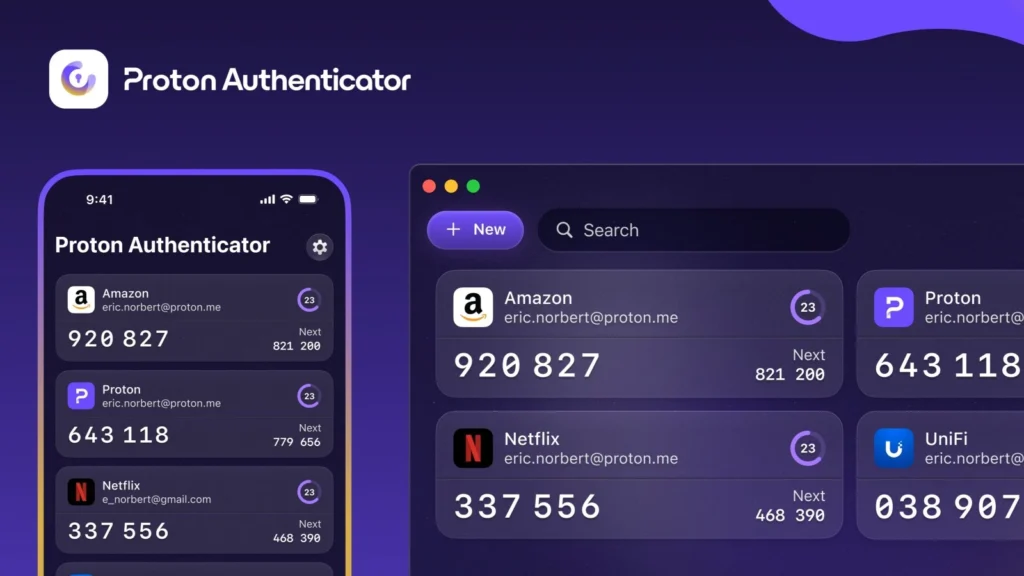Stay secure with the new Proton Authenticator app — a free, cross-platform, privacy-first two-factor authentication solution that rivals Google Authenticator and Microsoft Authenticator. Discover Proton’s latest security innovation designed to protect your digital identity with end-to-end encryption and open-source transparency.

In a world where online security and privacy are more essential than ever, Proton has taken a bold stand. On July 31, 2025, Proton released Proton Authenticator, a free, cross‑platform two‑factor authentication (2FA) app designed as a privacy-conscious alternative to Google Authenticator and Microsoft Authenticator.
Built with openness and transparency at its core, Proton’s latest tool offers end-to-end encryption, offline support, and secure sync—without tracking, ads, or vendor lock-in. Available on iOS, Android, Windows, macOS, and Linux, Proton Authenticator makes strong security accessible to everyone, not just privacy enthusiasts.
Table of Contents
Why Proton Authenticator Matters for US Users
🛡️ Privacy-First Authentication
Unlike many mainstream 2FA apps, Proton Authenticator is fully open source, which means anyone can audit the code. It’s ad-free, avoids data collection, and doesn’t require you to register an account just to use it.
📱 Universal Compatibility & Secure Sync
Install it on all your devices—smartphones, desktops, laptops—and enable encrypted backups and secure syncing across them. Move between devices without risking lost access to your second-factor codes.
🔐 Offline Support & Biometric Locking
Proton Authenticator works completely offline and supports biometric or PIN-based app locking. It generates time-based one-time-passwords (TOTPs) every 30 seconds—whether you’re connected to the internet or not.
🔁 Easy Migration from Other Authenticator Apps
Seamlessly import codes from Google Authenticator, LastPass, Microsoft Authenticator, Bitwarden, and others. Export your codes if needed—helping avoid lock-out scenarios when switching devices or services.
What US Users Need to Know: Setup & Functionality
Setting Up Proton Authenticator
Install on your device of choice, scan QR codes from services like Gmail or online banking, or manually enter TOTP secrets. You’ll be prompted to back up your codes safely and optionally lock the app with biometrics or a PIN.
Sync Across Devices, Securely
Enable end-to-end encrypted backup for seamless code migration. It works across mobile and desktop, preserving your authentication tokens even when switching platforms.
Best Practices
Keep device clocks synced to avoid verification failures, save recovery codes from services, and store a backup method in case you lose access to your authenticator device.
Proton Authenticator vs Proton Pass vs Security Keys
While Proton Pass also includes built-in 2FA support via TOTP, Proton Authenticator provides a standalone app with focused features: cross-device syncing, offline use, and encrypted backups. It goes a step further than Pass by not requiring a Proton account or subscription.
Security keys (FIDO2/U2F) like YubiKey remain supported across Proton services, but those require physical hardware. Proton Authenticator provides a flexible software-based alternative for users who don’t want to carry a physical key—or need multi-device convenience.
🎯 Ideal Use Cases for US Audiences
- Privacy Advocates & Security-Conscious Users: If you want strong authentication without giving up your data to Big Tech.
- Everyone Who Switches Devices Often: The secure sync ensures you never lose access to your codes.
- Users Without Access to Hardware Keys: Proton Authenticator provides robust 2FA without requiring separate hardware.
- Families or Freelancers: No subscription needed—use the app freely on multiple devices or share safely with family members.
📊 Quick Overview: Features, Pros & Cons
Key Features
- Open-source and ad-free
- Cross-platform support: iOS, Android, macOS, Windows, Linux
- Secure encrypted backup and cross-device sync
- Offline code generation
- Biometric/PIN app lock
- Import/export from other 2FA tools
| Feature | Description |
|---|---|
| Cross-Platform Compatibility | Available on Android and iOS for seamless device use |
| Privacy-First Design | Built with end-to-end encryption, no data harvesting |
| Open Source | Source code publicly available for community transparency |
| Secure 2FA Tokens | Stores TOTP codes locally and encrypted |
| Proton Account Sync | One-tap sign-in integration for Proton services |
| No Ads or Trackers | Completely free from advertising or data tracking |
Advantages
- Total privacy control—no data collection
- Works offline, with syncing
- Easy onboarding and transition from existing tools
- Free and no membership or subscription required
| Pros | Cons |
|---|---|
| Free and open-source | Limited integrations compared to major 2FA apps (for now) |
| Strong privacy and encryption | No cloud sync for non-Proton accounts |
| Works across Android and iOS | Still lacks features like push-based 2FA |
| No ads or tracking | New product — real-world testing still ongoing |
Limitations
- No support for physical security keys built-in
- No auto-fill integration unlike some password managers
- Sync backup requires storage space
- No business or enterprise analytics features yet
Final Thoughts: Should US Users Adopt Proton Authenticator?
If you take your online security and privacy seriously, Proton Authenticator is a standout. It delivers everything users need from 2FA—simplicity, privacy, reliability, and cross-platform support. Unlike proprietary alternatives, you remain in full control of your authentication data.
Switching from apps like Google Authenticator or Microsoft Authenticator is seamless, and the open‑source ethos makes Proton Authenticator trustworthy and transparent. Better yet—it’s entirely free, with no hidden fees or ads.
Proton Authenticator, Proton two-factor authentication app, Proton 2FA app, Proton security app, Proton privacy app, Proton vs Google Authenticator, Proton vs Microsoft Authenticator, free 2FA app, cross-platform authentication, privacy-first authentication app, open-source 2FA, secure two-factor authentication, Proton open source security, Proton 2FA review, Proton passwordless login
Thank You for visiting Tech Uplifter!
Don’t forget to Subscribe to our Official Newsletter for latest updates.